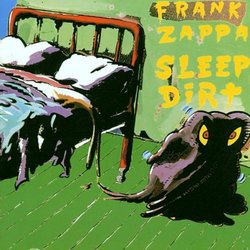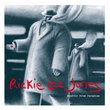| All Artists: Frank Zappa Title: Sleep Dirt Members Wishing: 9 Total Copies: 0 Label: Zappa Records Release Date: 5/2/1995 Album Type: Original recording remastered Genres: Alternative Rock, Jazz, Special Interest, Pop, Rock, Classic Rock, Metal Styles: Comedy & Spoken Word, Progressive, Progressive Rock, Album-Oriented Rock (AOR) Number of Discs: 1 SwapaCD Credits: 1 UPC: 014431052729 |
Search - Frank Zappa :: Sleep Dirt
 | Frank Zappa Sleep Dirt Genres: Alternative Rock, Jazz, Special Interest, Pop, Rock, Classic Rock, Metal
Japanese exclusive reissue of 1979 album. Limited to 2,000 pieces, it's packaged in a miniature LP sleeve. |
Larger Image |
CD DetailsSynopsis
Album Description Japanese exclusive reissue of 1979 album. Limited to 2,000 pieces, it's packaged in a miniature LP sleeve. Similar CDs
Similarly Requested CDs
|
CD ReviewsMy Fingers Got Stuck Jeff Hodges | Denton, TX United States | 04/19/2009 (4 out of 5 stars) "I try to keep my ears open for Zappa, and as a result I purchase something from his catalog once or twice a year. I'm sure I'm never get it all. Regardless, it's almost always a joy. Initially, though, I had some negative reactions to "Sleep Dirt." It seemed highly random and disparate. It's necessary to keep in mind, though, that Zappa was always as eclectic as he was prolific. As a collection, "Sleep Dirt" reveals many aspects of his rock output in the late 70s. As I have become more familiar with it, "Sleep Dirt" has revealed its strengths and cohered quite well into its own listening experience.
Inevitably, for me, more context almost always results in more appreciation. "Sleep Dirt" is intertwined with the Lather recordings, and teasing out their convoluted relationships helps to bring a better understanding. My experience with all of the Lather-related recordings predates that recording's release. I owned "Orchestral Favorites" for years before its release, and saw it as a strong recording on its own merit. "Sleep Dirt" is the same, but it represents a different cross-section of Zappa's work. Zappa has a bit of the George Lucas syndrome in that he liked to alter his recordings in order to offer "definitive" editions. Many people lament his decisions to rerecord drums or add vocals to albums that were already accepted as canonical. Apparently, "Sleep Dirt" is such an instance. I have never heard the original, all-instrumental versions of "Spider of Destiny" and the like. While I think the vocal performances are just fine, the lyrics belong to Zappa's unfinished space opera "Hunchentoot." When Zappa veers into sci-fi themes his lyrics are often nonsensical to the extreme. On "Sleep Dirt," however, this theme helps the album to cohere. Bizarre alien invasion themes notwithstanding, Zappa's sonic playfulness is in full effect. Zappa the improviser and Zappa the composer are, as ever, in conflict on "Sleep Dirt." In his A&E biography, Zappa said that without certain cues, jazz just seemed like "noodles" to him. Considering his soloing style, this is a little ironic. The guitar work on "Sleep Dirt" is very harmonically aloof, and in the course of getting into it, I began to wonder if Zappa was using xenochronus techniques during these sessions. However, the energetic "jammy" band interactions with Bozzio and O'Hearn on "The Ocean is the Ultimate Solution" and the rare acoustic guitar duet that is the title track confound this possibility. Later in his career, his xenochronus experiments would influence Zappa to play in a similar (but even more aloof) style in live settings. Perhaps the recordings represented on "Sleep Dirt" predict that late 80's shift. Zappa the composer, however, is strongly represented throughout the collection, my favorite example being "Regyptian Strut." THE LOWDOWN: Someday I'll get "Lather" and really confuse myself. For now, each of the recordings that came from these sessions have become meaningful to me. "Sleep Dirt" is a good snapshot of the many sides of Zappa's musical conception in the late 70s. It is perhaps not his most definitive work, but it is still an important part of Zappa's overall oeuvre. " |

 Track Listings (7) - Disc #1
Track Listings (7) - Disc #1



